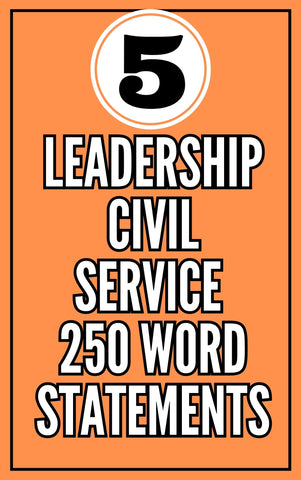In the Civil Service, exceptional leadership skills aren't just beneficial—they're downright vital. When creating your application, it's crucial to compose engaging 250-word statements that reflect your dedication to 'Leadership'. You only have 250 words to leave a compelling impression!
Feeling a bit anxious? Don't worry, we're here to support you. In this article, we'll help you shape succinct yet compelling 250-word statements that validate your commitment to excellent leadership within the Civil Service. Ready to take the plunge? Let's dive right in! 🚀
 Grab your detailed guide today! 📚
Grab your detailed guide today! 📚
What Exactly Does "Leadership" Mean in the Civil Service?
First off, let's clarify what 'Leadership' signifies in the Civil Service.
Within the Civil Service context, 'Leadership' involves guiding and inspiring others towards shared goals. It necessitates a combination of strategic vision, effective decision-making, excellent communication, and an ability to drive and manage change. It's about nurturing a culture of leadership that enables you and your team to achieve common objectives.
In your 250-word statements, you should emphasize your commitment to leadership and your proactive stance in considering diverse viewpoints before making decisions. Highlight situations where you've clearly communicated strategies, made decisions, led change, and inspired others to follow a specific path.
Building Your 250-Word Statements Using B-STAR ✨
Now, let's discuss how to build your 250-word statements using the B-STAR approach, focusing on 'Leadership'. Here's the structure:
Keeping Your Statement Within the 250-Word Limit 📝
Creating a compelling 250-word statement can be tricky, but it's vital for succinctness and clarity. Here are a few tips:
✅ Prioritize: Identify the most critical aspects of your story. Include details that directly support your belief, situation, task, action, and result. Eliminate any irrelevant information.
✅ Be concise and precise: Articulate your thoughts clearly. Use precise language and steer clear of repetition. Swap lengthy phrases with single words wherever feasible.
✅ Stick to the B-STAR approach: Ensure each part of the B-STAR method is concise. Balance the length of each section, and be clear and direct in your descriptions.
✅ Avoid repetition: Don't restate the same idea in different words. Each sentence should introduce fresh information or provide a unique insight.
✅ Review and edit: Check your statement for chances to make your writing more concise. Edit rigorously, removing any superfluous words or sentences.
✅ Seek feedback: Request others to review your statement. They might spot areas where you can further refine or simplify your language.
With these strategies, you can craft a succinct yet powerful 250-word statement that showcases your dedication to 'Leadership' in the Civil Service.
Example Statement: Leadership 📜
Belief: I staunchly believe that exceptional leadership is vital in the Civil Service. I value strategic vision, effective decision-making, and inspiring my team, fostering a similar mindset among my colleagues.
Situation: In my role as a team lead at Department XYZ, we encountered a significant challenge that required exemplary leadership to attain the desired outcomes.
Task: My role was multifaceted—I had to communicate strategy, make crucial decisions, and guide my team towards a common goal.
Action: Committed to leadership, I facilitated strategic dialogues, made informed decisions, and spurred change. I ensured that all perspectives were considered, promoting a culture where effective leadership was lauded.
Result: This approach considerably contributed to attaining positive outcomes. The team adopted a more effective leadership process, leading to successful results and enhanced stakeholder satisfaction. This experience solidified my belief in 'Leadership' and its transformative power within the Civil Service.
See 5 real-life example answers 💡
FAQ: Leadership in the Civil Service ❓
What does 'Leadership' mean in the Civil Service?
'Leadership' is about guiding and inspiring others, making informed decisions, and leading change towards shared objectives.
Why is 'Leadership' important in the Civil Service?
It's crucial because it facilitates collective understanding, effective collaboration, and alignment towards common goals. This behaviour encourages both individual and collective success, fostering efficient public service.
How can I demonstrate 'Leadership' in my role?
You can demonstrate this behaviour by clearly communicating strategies, making informed decisions, leading change, and inspiring others towards common objectives. Promoting a culture of leadership also showcases this behaviour.
What are some examples of 'Leadership'?
An example could be leading a team to achieve a shared goal or implementing change within a department. Another instance could be clearly communicating a strategy to diverse stakeholders.
How can I showcase 'Leadership' in my 250-word statement?
Use the B-STAR method (Belief, Situation, Task, Action, Result) to structure your statement. Begin by expressing your belief in the importance of leadership, describe a situation where you embodied this, outline your task, detail your actions, and conclude with the results.
Can 'Leadership' apply to all roles within the Civil Service?
Absolutely. Regardless of your role, exceptional leadership is essential for optimum performance in the Civil Service.


